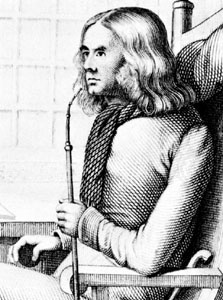Chamisso, Adelbert von
German-language lyricist
original name Louis-Charles-Adélaïde Chamisso de Boncourt
born Jan. 30, 1781, Château de Boncourt, Champagne, France
died Aug. 21, 1838, Berlin, Prussia 【Germany】
 German-language lyricist best remembered for the Faust-like fairy tale Peter Schlemihls wundersame Geschichte (1814; Peter Schlemihl's Remarkable Story).
German-language lyricist best remembered for the Faust-like fairy tale Peter Schlemihls wundersame Geschichte (1814; Peter Schlemihl's Remarkable Story).When he was nine, Chamisso's family escaped the terrors of the French Revolution by taking refuge in Berlin. After abandoning his native French language for German, Chamisso published his first works in the Berliner Musenalmanach, which he coedited with Karl August Varnhagen von Ense (Varnhagen von Ense, Karl August) from 1804 to 1806. In 1804 he founded the Nordsternbund, a society of Berlin Romanticists. From 1807 to 1812 Chamisso toured France and Switzerland, participating in the literary circle of Madame de Staël (Staël, Germaine de). In 1812 he enrolled at the University of Berlin, devoting himself to scientific studies.
In 1814 Chamisso published the tale of Peter Schlemihl, which, more than any other work, won lasting recognition for its author. The story of a man who sold his shadow to the devil, it allegorized Chamisso's own political fate as a man without a country. Though rewarded with an inexhaustible purse, Schlemihl soon discovers that the lack of a shadow involves him in unexpected difficulties. He refuses, however, an offer to restore the shadow in exchange for his soul and instead, with the help of a pair of seven-league boots, wanders through the world searching for the peace of mind he has bartered away.
Chamisso's early poetry—as, for example, the cycle of poems Frauen-Liebe und Leben (“Woman's Love and Life”), set to music by Robert Schumann—depicted simple emotions with a sentimental naïveté common to German Romantic verse of the period. His narrative ballads and poems, such as “Vergeltung” (“Reward”) and “Salas y Gomez,” sometimes inclined to bizarre and mournful subjects. Chamisso's later poetry, however, became more realistic and was praised by the poet Heinrich Heine. Many of these later poems were patterned after the political lyrics of the French poet Pierre-Jean de Béranger (Béranger, Pierre-Jean de), whose works Chamisso translated in 1838. Because these translations, together with his own imitations, helped to introduce political themes into German poetry, Chamisso is considered by many critics to be the forerunner of the political poets of the 1840s.
Chamisso was also a noted scientist involved in the discovery of the metagenesis of certain mollusks and a philologist known for his studies of Australasian languages. When he was botanist on a scientific voyage around the world (1815–18), he kept a diary, Reise um die Welt mit der Romanzoffischen Entdeckungs-Expedition (1836; “Voyage Around the World with the Romanzov Discovery Expedition”), which became a classic of its kind.
- William Henry Harrison: Inaugural Address
- William Henry Holmes
- William Henry Ireland
- William Henry Jackson
- William Henry Pickering
- William Henry Twenhofel
- William Henry Vanderbilt
- William Henry Waddington
- William Henry Webb
- William Henry Welch
- William Henry West Betty
- William Hewson
- William H. Gass
- William H(ickling) Prescott
- William Hill Brown
- William H McNeill
- William Hogarth
- William Holabird
- William Holden
- William Holman Hunt
- William Holmes McGuffey
- William Hone
- William Hooker Gillette
- William Howard Taft
- William Howard Taft: Defense of a High Tariff